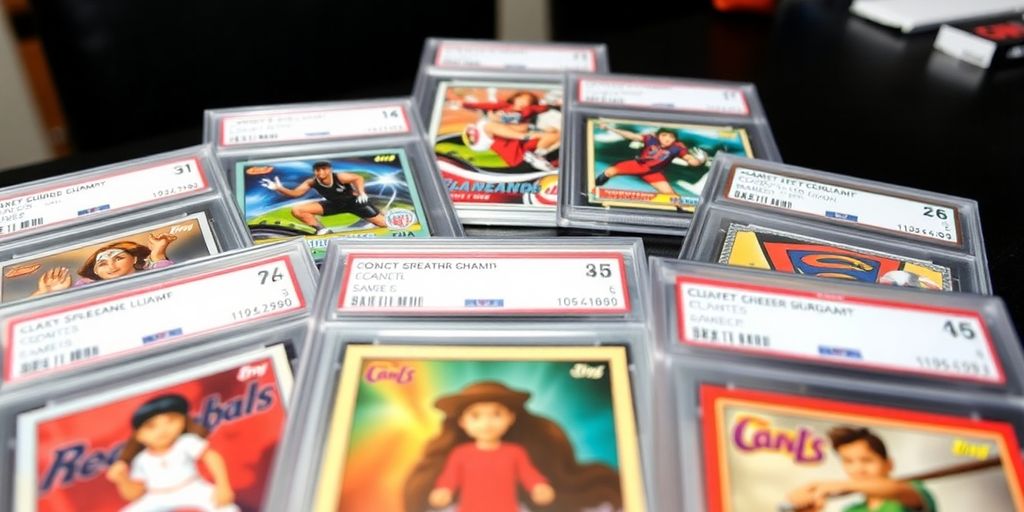If you’re a card collector, you may have heard about card grading. But what exactly is it, and why is it important? This guide will help you understand card grading services, the top companies in the field, and how to prepare your cards for grading. Whether you’re looking to increase the value of your cards or just want to keep them safe, we’ve got you covered. Let’s explore the world of card grading together!
- Discover the Best Rooftop Bar Near Me: A Guide to Scenic Sips and Stunning Views
- Discover the Best Women Clothing Store Near Me for the Latest Trends
- Where Can I Sell Scrap Metal Near Me: A Comprehensive Guide to Local Recycling Options
- Discover Hidden Gems: The Ultimate Guide to Art Galleries Near Me
- Where Can I Donate a Mattress Near Me? A Complete Guide to Local Donation Options
Key Takeaways
- Card grading helps determine the value and condition of your cards.
- Choosing a reputable grading company is essential for accurate results.
- Local grading options can save you time and shipping costs.
- Properly preparing your cards for grading can prevent damage.
- Understanding grading standards will help you make informed decisions.
Understanding Card Grading Services
What is Card Grading?
Card grading is a service where companies evaluate collectible cards, like sports or gaming cards. They look at different parts of the card, such as corners, edges, surface, and centering. This process helps collectors know the true value of their cards. After grading, the cards are returned in protective cases that show their grade and other important details.
You are viewing: Discovering Where to Get Cards Graded Near Me: A Comprehensive Guide
Importance of Card Grading
Grading is important because it provides a standard way to measure a card’s condition. Here are some key reasons why grading matters:
- Authentication: It confirms that the card is real.
- Value: A graded card can be worth more than an ungraded one.
- Protection: Graded cards are kept safe in special cases.
How Card Grading Works
The grading process usually follows these steps:
- Submission: You send your cards to the grading company.
- Evaluation: The company checks the cards for any damage or wear.
- Grading: Cards are given a grade on a scale from 1 to 10, with 10 being the best.
- Return: The graded cards are sent back to you in protective cases.
| Step | Description |
|---|---|
| Submission | Send cards to the grading service |
| Evaluation | Cards are checked for damage |
| Grading | Cards receive a grade from 1 to 10 |
| Return | Graded cards are sent back in protective cases |


Grading services are not just for cards; they can also grade autographs, tickets, and more!
In summary, understanding card grading services is essential for collectors who want to protect and enhance the value of their cards. It provides a clear and objective way to assess the condition of collectible items.
Top Card Grading Companies
Professional Sports Authenticator (PSA)
PSA is one of the most recognized names in card grading. They are known for their accuracy and reliability, making them a top choice for collectors. PSA grades a wide range of cards, including sports and trading cards. Their grading scale ranges from 1 to 10, with 10 being the highest quality.
Beckett Grading Services (BGS)
BGS is another leading company in the card grading industry. They offer a unique feature of subgrades, which provide detailed insights into the card’s condition. Their prices start at around $29 per card, with a turnaround time of about 60 business days. BGS is often praised for their thorough grading process, but some collectors have raised concerns about their consistency.
Sportscard Guaranty Corporation (SGC)
SGC specializes in grading sports cards, particularly vintage ones. They have a solid reputation for their grading standards and customer service. Their fees start at $12 per card for bulk submissions, with a turnaround time of approximately 40 working days. SGC is known for their protective cases, which help keep cards safe.
Certified Guaranty Company (CGC)
CGC is a well-established grading company that offers competitive pricing, starting at $12 per card for bulk submissions. They provide a grading scale from 1 to 10, similar to PSA. However, recent changes in their grading standards have raised some concerns among collectors. CGC is still a viable option for those looking to grade their cards, especially if they are on a budget.
| Company | Starting Price | Turnaround Time | Special Features |
|---|---|---|---|
| PSA | Varies | 10-20 days | High accuracy |
| BGS | $29 | 60 days | Subgrades |
| SGC | $12 | 40 days | Vintage focus |
| CGC | $12 | 40 days | Competitive pricing |
Choosing the right grading company can significantly impact the value of your cards. Always consider their reputation and grading standards before making a decision.
Factors to Consider When Choosing a Card Grading Company
Read More : Discover the Best Lepakshi Store Near Me for Authentic Handicrafts
When selecting a card grading company, there are several important factors to keep in mind. Understanding these factors can help you discover the best card grading service in 2024.
Reputation
- Look for companies with a strong reputation in the industry.
- Check online reviews and ratings to see how they are viewed by customers.
- Consider companies known for their accuracy and consistency, like PSA and BGS.
Turnaround Time
- Different companies have varying turnaround times for grading.
- Some offer expedited services for a higher fee, which can be useful if you need your cards back quickly.
- Always ask about the expected time frame before sending your cards.
Grading Standards
- Each company has its own grading standards. Some may be stricter than others.
- Ensure the company provides clear guidelines on how they grade cards.
- Transparency in grading can help you feel more confident in your choice.
Pricing
- Compare the pricing structure of different companies.
- Costs can range from $8 to $40, depending on the service level.
- Remember, cheaper options may not always be the best; consider the value you’re getting.
Choosing the right grading company can significantly impact the value of your cards. Take your time to research and make an informed decision.
Local Options for Card Grading
Finding Local Grading Services
Finding a local grading service can be a great way to get your cards graded without the hassle of shipping. Here are some tips to help you:
- Search online for grading services in your area.
- Ask fellow collectors for recommendations.
- Visit local card shops; they often have connections to grading services.
Card Grading at Conventions
Attending conventions can be a fun way to get your cards graded. Many events feature grading companies that offer on-site services. Here’s what to keep in mind:
- Check the schedule for grading services at the event.
- Bring your cards in protective sleeves.
- Be prepared to pay for grading fees on the spot.
In-Person Grading Events
In-person grading events are becoming more popular. These events allow collectors to submit their cards directly to grading companies. Here are some benefits:
- Immediate feedback on your cards.
- Networking opportunities with other collectors.
- Potential discounts on grading fees.
Remember: Always check the reputation of the grading service before submitting your cards. This ensures you get the best possible grading experience.
For those looking for local grading options, consider checking out places like Beckett Collectibles, which is based in Plano, Texas, and offers grading for various collectibles, including trading cards.
Preparing Your Cards for Grading
Cleaning and Handling Cards
To ensure your cards are ready for grading, handle them with care. Here are some steps to follow:
- Check the condition of each card before submission.
- Clean cards gently using a microfiber cloth to avoid scratches.
- Avoid touching the surface of the card; hold it by the edges.
Packaging for Shipment
When sending your cards for grading, proper packaging is crucial. Use the following materials:
- Penny sleeves to protect each card from scratches.
- Top loaders for added protection against bending.
- Bubble wrap for cushioning during shipment.
Submission Forms and Fees
Before sending your cards, make sure to fill out the submission forms accurately. Here’s what to include:
- Your contact information.
- A list of the cards being submitted.
- Payment for grading fees, which can vary by company.
Remember, taking the time to prepare your cards properly can significantly impact their grading outcome!
Protecting Ungraded Cards
When it comes to keeping your ungraded cards safe, there are a few essential methods you should know. Using the right materials can make a big difference in preserving their condition.
Using Penny Sleeves
- A penny sleeve is a soft, protective cover that helps prevent scratches and fingerprints.
- It’s a great first layer of defense for your cards.
Top Loaders and Card Savers
- A top loader is a hard plastic case that provides extra protection.
- It keeps your cards secure and prevents bending or damage.
- Card savers are another option that offers a balance between flexibility and protection.
Storage Tips
- Store your cards in a cool, dry place to avoid moisture damage.
- Keep them away from direct sunlight to prevent fading.
- Consider using a wall mount baseball card display case with UV protection for showcasing your favorite cards while keeping them safe.
Protecting your cards is just as important as grading them. Taking these steps can help maintain their value and condition for years to come!
Common Issues and Solutions in Card Grading
Inconsistent Grades
Read More : Explore Thrissur: Top Tourist Places Near Me for an Unforgettable Experience
One common problem collectors face is inconsistent grades. Different grading companies may evaluate the same card differently. This can be frustrating, especially if you’re trying to sell or trade your cards. To avoid this:
- Research the grading standards of each company.
- Consider using a company with a strong reputation.
- If possible, get a second opinion from another grader.
Damage During Shipping
Shipping cards can lead to damage during transit. To protect your cards:
- Use sturdy packaging materials.
- Include padding like bubble wrap.
- Clearly label the package as fragile.
Customer Service Challenges
Sometimes, collectors encounter customer service challenges. This can include long wait times or unhelpful responses. To improve your experience:
- Keep records of all communications.
- Be polite but firm in your inquiries.
- Look for companies known for good customer service.
Remember, taking the right steps can help you avoid many common issues in card grading. Proper preparation and research are key to a smooth grading experience!
Final Thoughts on Finding Card Grading Services
In conclusion, this guide aims to help you understand the world of card grading services so you can make smart choices for your collection. The top companies, like PSA, SGC, CGC, and BGS, dominate the market, with PSA leading by a large margin. However, even with these well-known services, you might face issues like slow responses or mistakes in grading. If you have your own experiences with grading, we’d love to hear about them! And if you spot any mistakes in this guide, please let us know so we can keep it accurate for everyone.
Frequently Asked Questions
What does card grading mean?
Card grading is a way to check the condition of a trading card. Experts look at things like the edges, surface, and corners to give it a score.
Why is card grading important?
Grading helps collectors know how valuable a card is. A higher grade usually means the card is worth more money.
How do I prepare my cards for grading?
Make sure to clean your cards carefully, package them well for shipping, and fill out any necessary forms.
Can I find grading services near me?
Yes! You can look for local shops that offer grading services or check for events like conventions that might have grading options.
What should I do if my card gets damaged during shipping?
If your card is damaged, contact the grading company right away. They should have a process to help you with this issue.
How can I protect my cards that are not graded?
Use penny sleeves and top loaders to keep ungraded cards safe. These will help prevent scratches and damage.
Soure: https://herego.net
Category: near me


